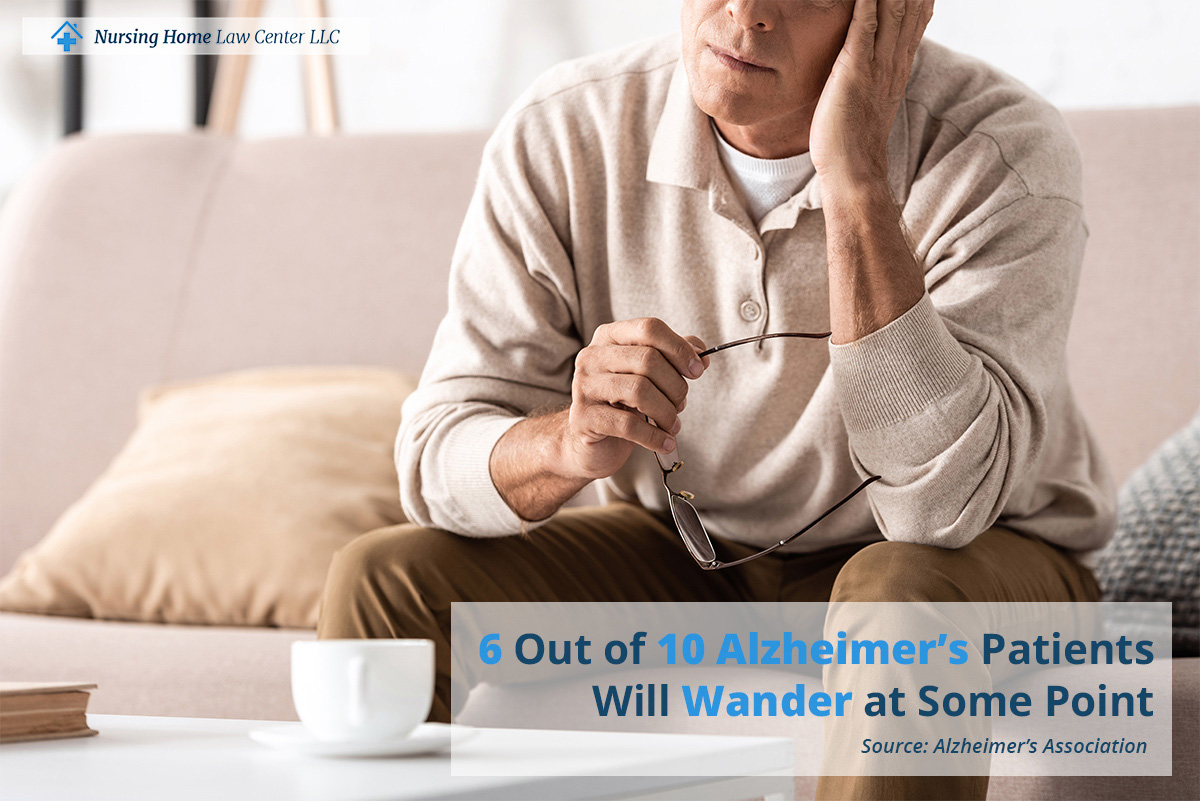legal resources necessary to hold negligent facilities accountable.
Elopement in Nursing Homes
In nursing homes, elopement involves a resident wandering off and leaving the facility without authorization. It creates a high risk of the elderly person getting lost, sustaining serious injuries, becoming a victim of a crime, or even dying.
Did your loved one become injured due to a nursing home's negligence and lack of necessary security measures to prevent elopement? If so, you could hold the assisted living facility liable for your loved one's injuries and your family's losses.
Contact the nursing home abuse lawyers at Nursing Home Law Center, LLC, at (800) 926-7565 (toll-free phone number) for a free consultation to explore your legal options. Our personal injury legal team can ensure you receive the compensation you deserve.

What is Elopement in an Assisted Living Facility?
In assisted living facility care, elopement is the act of wandering outside or throughout the facility. It often occurs in patients with a tendency to wander, including those with a mental impairment like dementia and Alzheimer's disease.
Types of Wandering
Wandering can be classified into these categories:
- Aimless wandering: When patients are bored, stressed, or uncomfortable, they may wander without a destination or goal.
- Environmentally cued wandering: A resident's response to some environmental stimuli may trigger wandering.
- Purposeful wandering occurs when a resident tries to find something or someone. Purposefully wandering patients may also be agitated about something, either real or imagined.
- Reminiscent wandering: Reminiscent or fantasy wandering is when an elderly person is unaware of their surroundings and wanders in an imagined environment.
Wandering becomes elopement when a resident leaves the nursing home facility.
Why Do Some Nursing Home Residents Elope?
Nursing home residents may wander in or escape from their nursing home facilities due to:
Alzheimer's Disease
Many resident elopement cases involve patients with Alzheimer's disease, an illness characterized by the loss of primary mental functions, particularly memory, which can lead to wandering and nursing home elopement.
Medication Side Effects
Some medications, such as sedatives and antidepressants, can cause confusion. Patients taking these drugs can wander if they don't receive psychiatric care and monitoring. Overmedication is also a common contributor to wandering.
Unmet Needs
Nursing home residents who do not receive adequate food, water, or exercise may wander to look for something or someone to fulfill their needs.
Unfamiliar Environment
New nursing home residents may have a wandering or elopement risk because they don't recognize their surroundings. This problem often occurs in elderly residents with a greater mental confusion propensity.
Why Do Elopement and Wandering Occur in Nursing Homes?
Elopement in nursing homes and assisted living facilities can occur due to the following factors:
Understaffing
Chronic understaffing is the main contributor to wandering in nursing home facilities. It is the root issue of many problems that can lead to wandering or elopement, such as:
- Lack of Supervision: Adequate supervision is crucial for all people, especially those at a greater risk of wandering. A lack of proper staffing can lead to individuals wandering off or hurting themselves because there is no one there to stop them. Staff members must also remain vigilant to ensure patients do not leave the facilities without a proper exit procedure.
- Neglect: When a nursing home facility fails to provide a patient's basic needs, that patient may wander to try and find them elsewhere. Understaffing creates a significant risk of neglect due to a lack of people to provide adequate care for everyone.
- Abuse: A disproportionate resident-to-employee ratio can lead to staff burn-out, which, in turn, increases the risk of nursing home abuse (including sexual, physical, and emotional).
Poor Nursing Home Neglect and Abuse Prevention
These problems typically occur due to a lack of anti-abuse and neglect procedures, such as:
- Conducting background checks to see if applicants have a history of abuse or violence
- Providing proper training for all staff members to prevent neglect and abusive behavior
- Ensuring all departments are adequately staffed to avoid abuse and neglect

Medication Errors and Improper Monitoring
Nursing home staff must ensure that patients taking drugs that cause confusion are closely monitored. Otherwise, these patients may wander because they don't know where they are or are looking for something to relieve their discomfort.
Medication-related resident elopement may occur due to the following:
- Overmedication
- Medication errors
- Inadequate monitoring
- Sleep disorders
Inadequate Security
A lack of security measures elevates the risk of harm for wandering patients. Related issues include:
- Lack of a proper exit procedure: Every assisted living facility must have an exit protocol to prevent patients with dementia-related issues and other cognitive impairments from leaving the facility without supervision.
- Insufficient security personnel: A lack of security employees can lead to uncrewed stations at exits and entrances and unmonitored surveillance cameras.
- Lack of working locks: Some high-risk residents need locked windows and doors to prevent them from wandering and hurting themselves. Not installing good locking and alarm systems can create serious risks.
- Lack of security cameras: Surveillance cameras help prevent confused residents from wandering through or off the premises without supervision.

Lack of Elopement-Specific Prevention Procedures
A nursing home must have procedures and protocols to prevent wandering and elopement for at-risk individuals, including:
- Patients with prior incidents of wandering or elopement
- Older adults with dementia, autism, and other forms of mental impairment
- Failure to identify patients with elopement risks
- Failure to evaluate residents' elopement histories and create individualized prevention tactics based on the data
Consequences of Elopement in Nursing Homes
Elopement in nursing homes is a serious concern for residents' safety and security. A patient leaving their nursing home or assisted living facility can suffer harm in several ways.
- Serious injury: If a resident is wandering unsupervised and gets into an accident or violent incident, they could sustain significant injuries.
- Malnutrition and dehydration: In elopement incidents where nursing home staff fails to find a missing patient for an extended period, that patient may suffer malnutrition and dehydration due to lack of proper food and water.
- Mental or emotional trauma: Resident elopement can lead to traumatic incidents, affecting a resident's mental and emotional well-being.
- Wrongful death: There is always a risk of fatality when a resident wanders alone, be it through an accident, crime, or natural causes.
Can You Hold the Nursing Home Liable if Your Loved One Elopes?
Nursing home facilities are responsible for residents' safety and well-being. Part of this legal obligation is preventing elopement and its contributing factors, such as nursing home neglect and abuse.
If your family member sustains an injury while wandering in the facility or leaves the premises entirely. In that case, you could hold the nursing home liable through a personal injury claim or lawsuit.
Liable Parties
In nursing home elopement cases caused by facility or organizational deficiencies, the defendant will likely be the nursing home owner. On the other hand, claims that involve nursing home abuse or neglect may include the following as liable parties:
- Nursing home staff members
- Visitors
- Other residents
- Nursing home administration
Evidence
The following forms of evidence can help you prove the nursing home's negligence:
- Surveillance footage of the resident wandering or leaving the facility
- Records showing a history of elopement or wandering
- Documentation of the facility failing to meet your loved one's personal safety needs (e.g., faulty door locks)
- Documents proving your family member is an at-risk resident for wandering behavior (e.g., diagnosis of Alzheimer's)
- Police report, if a crime or accident is involved
- Witness accounts from nursing home staff members, visitors, residents, or people that have seen your loved one outside the premises
Compensation
A nursing home that fails to keep your loved one safe from harm could be liable for the following damages:
- Medical bills
- Disability
- Pain and suffering
- Loss of quality of life
- Wrongful death
Discuss Your Case with an Experienced Nursing Home Elopement Lawyer
Nursing homes and assisted living facilities are fully responsible for patient safety. When they fail to prevent elopement or wandering, a resident can suffer serious injuries, disability, or even death. At the same time, family members are left to pick up the pieces and deal with the resulting damages.
If your loved one gets injured while wandering inside or outside their nursing home, you have the right to seek legal compensation.
The skilled attorneys at Nursing Home Law Center, LLC, can provide the assistance you need to obtain justice for such negligence. Contact us at (800) 926-7565 for a free consultation.
Our nursing home abuse lawyers handle all accepted cases on a contingency fee basis. This agreement ensures you only have to pay for our legal services if we win your case.
 Chicago Nursing Home Abuse Attorney Nursing Home Law Center LLC Home
Chicago Nursing Home Abuse Attorney Nursing Home Law Center LLC Home